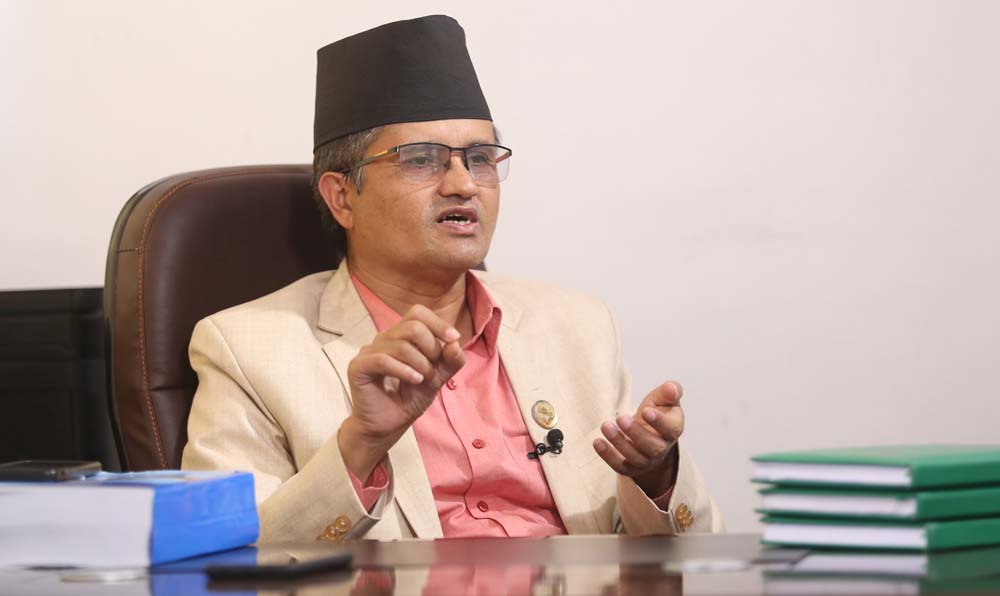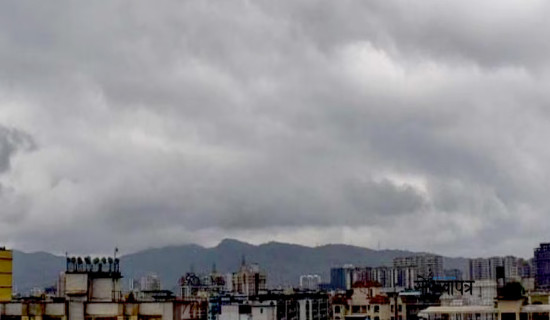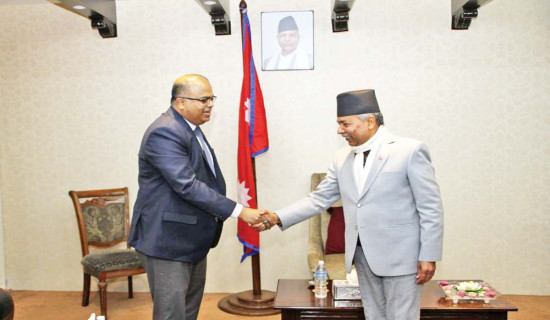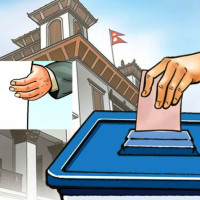- Thursday, 22 January 2026
'We've recommended action against Lamichhane, others'
Following a prolonged political dispute in the Parliament, the House of Representatives constituted a special investigation committee to address the misappropriation of cooperative savings funds. After over three months, the committee submitted its report, which spans over 1,100 pages and covers the concept of cooperatives, current governance issues, and financial assessments of troubled cooperatives. The government has committed to implementing the report’s recommendations. In an interview with a Gorkhapatra team, Committee Chairman Surya Bahadur Thapa discussed the report’s findings and recommendations, emphasising the need for reform to protect cooperative members and ensure the integrity of the cooperative sector. Excerpts:
After spending more than three months to investigate the problems facing the cooperative sector, what did the committee find?
The committee uncovered significant issues, concluding that 40 organisations have liabilities exceeding Rs. 87 billion. The Constitution of Nepal designates cooperatives as one of the three pillars of the economy, but the report raises concerns about the viability of this pillar.
The investigation committee was formed in response to the ongoing crisis. Nepal's Constitution uniquely institutionalises cooperatives as a distinct economic pillar, a concept not widely adopted elsewhere. However, effective legal arrangements and regulatory bodies are lacking. The emphasis on self-regulation has overshadowed necessary oversight, leading to ineffective practices. The Cooperative Act has largely promoted self-regulation without adequate enforcement.
What is the current status of self-regulation in cooperatives?
Self-regulation is widely recognised in cooperatives, yet the responsibility for promoting it has not yielded effective regulatory structures. The committee found that while the cooperative department has authority and 761 regulatory bodies are in place across municipalities and provinces, these entities have failed to perform their duties. Particularly for savings and credit cooperatives, there needs to be a unified financial policy and on-site monitoring. Effective self-regulation relies on strong institutions, but there are concerns about the quality of oversight, including the financial situations, directors, and auditors involved.
Does this mean that the members of the cooperative are not responsible?
The issue isn’t a lack of education among members. Instead, there has been inadequate oversight to hold directors accountable and enforce self-regulation. Directors have not exerted pressure to rectify their wrongdoings through proper decision-making processes. Additionally, some individuals have misused the cooperative model to pursue other agendas, deviating from its intended purpose.
What did the committee find regarding the expansion of networking businesses in cooperatives?
The committee's financial analysis revealed significant issues, such as individuals holding multiple positions across several cooperatives. For example, GB Rai's association violated cooperative laws without detection by regulatory bodies, including the Metropolitan Corporation and provincial authorities. Shockingly, some regulators endorsed these individuals as exemplary, even recommending them for leadership roles in non-profit cooperatives, highlighting a serious lack of oversight and awareness within the cooperative department.
Have those responsible for regulation been involved in collusion?
Yes, evidence suggests that regulators have been involved in fraudulent activities. Notably, the Registration Officer facilitated the transfer of the Supreme Cooperative, comprising Ambe and Maitreya, from Omprakash Gurung to GB Rai. This operator was highly regarded, with the officers claiming there was no better manager for the role.
What reforms do you recommend for better accountability of regulators?
To enhance accountability, regulators must adhere strictly to constitutional and legal frameworks. Currently, it appears that oversight is lacking, leading to unchecked actions. For instance, one registrar approved the expansion of over 150 service centres without proper justification. We have urged a halt to the registration of multi-purpose cooperatives operating as savings and loan entities. Additionally, we have called for the cancellation of unnecessary service centre expansions. Notably, an official is facing legal action for a Rs. 12 million transaction related to the Mitramilan Cooperative, these issues stem from deliberate misconduct, not mere accidents.
What structural reforms are necessary to address the issues in the cooperative sector?
Three key structural reforms are urgently needed. I have discussed this with the Prime Minister. Despite the Cooperative Act- 2074 and the regulations- 2075, the Savings and Credit Protection Fund is yet to be established. While banks have similar protections, cooperatives lack any security for even minimal savings. The government promised to contribute Rs. 240 million, with cooperatives adding Rs. 360 million. Had the Act been implemented, the vulnerable savers would not have been in crisis today. There is a troubling trend of allowing large savings without legal protection for smaller amounts. We have requested a prompt establishment of the savings protection fund, and the Prime Minister has committed to this.
Secondly, a credit information centre is needed, as the cooperative sector currently lacks a system to track loan information. This centre could be integrated with the banking and financial sectors.
Lastly, debt recovery tribunals, mandated by the Cooperative Act, need expansion rather than the creation of new structures. Enhancing existing tribunals with more personnel will help manage debt recovery effectively, thereby safeguarding small savings in the future without overcomplicating the system.
Have cooperative operators exploited structural weaknesses, or is there a question of their intentions?
Not all cooperatives are problematic, some operate well despite structural weaknesses like the absence of a credit information centre, protection fund or tribunal. Those committed to good governance advocate for reforms like a loan information centre and recovery tribunal. However, those with bad intentions exploit these gaps.
What is the committee's opinion on the return of savings after interrogating cooperative directors?
The directors we interrogated claimed they could resolve the issues if released. Despite assurances, little has been done, such as with Ichcharaj Tamang and Ram Bahadur Gautam, who failed to act. Being in jail doesn’t solve financial crises, as noted by investigators and stakeholders. For example, during Sudhir Basnet's imprisonment, valuable land linked to savers' funds vanished. We recommend managing immovable property, restricting travel, and requiring progress reports to facilitate the return of savings. The Home Minister agrees that while challenging, reconciliation can help resolve these issues.
Cooperative owners claim that unnecessary arrests and problematic announcements hinder refunding savers. Did you find such cases?
It’s inappropriate to label a cooperative with billions in assets as problematic based solely on 25 complaints. Many cooperative directors are unresponsive and unreachable, showing no accountability to the parliamentary committee. Their disregard for saver concerns has created a significant lack of trust. In contrast, Rajendra Shakya actively engaged with his savers, maintaining communication and transparency despite his cooperative's struggles. By dedicating time and effort, he managed to resolve issues and restore trust.
Has the greed for high interest rates and the lack of savings limits caused problems for savers in cooperatives?
Yes, this is indeed a significant issue. Many savers are lured by promises of high returns, some cooperatives offer rates as high as 60 per cent. The reference interest rate is 16 per cent, yet individuals often prefer cooperatives for slightly higher returns, leading to risky investments. For instance, Yam Bahadur Bista from Jhapa invested Rs. 110 million in Goodwill Cooperative after liquidating all his real estate, only to find himself without funds for necessities today.
Additionally, cooperatives have been exploited to obscure asset sources. Before the Money Laundering Act was implemented, funds were collected without proper disclosure. Currently, many applications for the return of savings are met with disappointing responses, as the recoverable amounts often fall short of the total savings due to undisclosed assets. We recommend legalising funds collected without tax by imposing a tax obligation, thereby bringing them under regulatory scrutiny. This approach aims to uncover the origins of these funds and stabilize the cooperative sector, protecting savers from further losses while addressing the overarching issue of financial accountability.
What illegal investment areas have cooperatives ventured into?
Many cooperatives have illegally invested in prohibited areas such as Gurkha Media, real estate, and hydro projects, which go against cooperative principles. The committee has analysed 40 cooperatives, revealing that those adhering to cooperative principles, particularly women-led initiatives, are functioning well despite occasional challenges. However, cooperatives violating these principles face severe repercussions, including misuse of savings and fraud, leaving them in precarious positions. Overall, the situation indicates a significant need for regulatory oversight in the cooperative sector.
What specific aspect would you like to focus on regarding the cooperative savers' situation?
There's uncertainty about returning the savings of 40 cooperatives due to bad debts and mismanagement. Gorkha Saving faces significant debt linked to DB Bomjan and Tej Bahadur Tamang, raising doubts about recovery. CB Lama's loans and promises add to the complexity, as he faces scrutiny over his commitments. The overall situation is dire, with insufficient assets to cover the savings.
What is the committee's recommendation regarding Rabi Lamichhane?
The parliamentary committee's report highlights controversy, noting that both supporters and critics of misappropriation welcomed the investigation. It details a financial analysis related to the Gorkha Media Network. While Lamichhane participated in the committee, he is implicated in illegally transferring over Rs. 655.4 million from cooperatives to fund Galaxy Four K Television. The recommendation calls for legal action against him and others involved.
Did he claim to have no financial rights?
Yes, he stated he was only involved in programmes, but 90 per cent of cheques bore his signature, with around Rs. 220 million spent through single signatures.
What is the Miteri Sahakari embezzlement case involving Dhanraj Gurung?
The case involves embezzlement of Rs. 125 million by cooperative manager Jyoti Gurung, which grew to Rs. 148.1 million. Dhanraj Gurung demanded a parliamentary inquiry and claimed he was not involved, despite personal issues and guarantees related to his wife's debts.
















